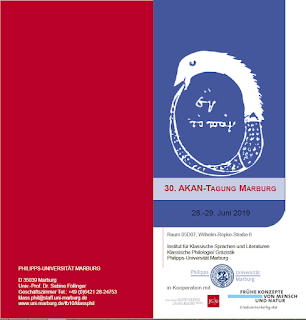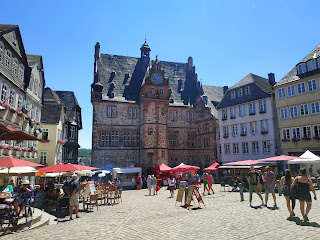Report on the 30th AKAN Conference, June 28-29, Marburg
A blog post by Aleksandar Milenković.
Traditionally, every fifth year, the AKAN conference is organized at another university. This year’s 30th AKAN took place at the Philipps-Universität in Marburg, a beautiful university town in Hessen. The conference was organized by Univ.-Prof. Dr. Jochen Althoff and Prof. Dr. Sabine Föllinger. This time, the programme was divided into two days, with the keynote lecture taking place on June 28th and the rest of the talks on June 29th.
Traditionally, every fifth year, the AKAN conference is organized at another university. This year’s 30th AKAN took place at the Philipps-Universität in Marburg, a beautiful university town in Hessen. The conference was organized by Univ.-Prof. Dr. Jochen Althoff and Prof. Dr. Sabine Föllinger. This time, the programme was divided into two days, with the keynote lecture taking place on June 28th and the rest of the talks on June 29th.
 |
| Fig. 1: AKAN flyer. |
The keynote speaker, Prof. Dr. Georg Wöhrle, gave a talk about western science and philosophy with a focus on Thales of Miletus, one of the early Greek philosophers from the 7th-6th century BC.
 |
| Fig. 2: AKAN program. |
Angela Pabst from Halle focused on Aristotle’s zoology and looked into traces of phronesis and ethos in animals. She examined Aristotle’s observation of behaviour in living animals, trying thereby to answer the question of how Aristotle obtained the information on this topic.
Sergiusz Kazmierski offered his research on the ever-intriguing question of the soul in the body according to Aristotle by cross-examining several texts, while Gottfried Heinemann focused solely on Aristotle’s Physika and investigated argumentation and demonstration in this treatise.
Katharina Bick investigated the role of astronomy and astronomical events within the agricultural calendars in the works of Varro, Columella and Pliny the Elder. She showed how Columella’s information is imprecise and unreliable due to his lack of knowledge of astronomy, while Pliny instructs the readers to observe the stars and nature themselves, thus betraying considerable astronomical knowledge.
Lothar Willms researched the Stoics’ reception of the so-called Presocratic philosophers in the 1st century BC/1st century AD. Namely, he offered an overview of passages from Poseidonius and Seneca the Younger (Naturales Quaestiones) that focussed on early philosophers whose works are otherwise lost.
Christoph Hammann spoke about Plotin’s differentiation between plants, animals and humans, a question that had been raised in previous talks in the context of Aristotle as well. Hammann began by tackling Plotin’s explanations to the question: how is it that different creatures come to be at all, when the soul is by itself unchangeable and imperishable and all souls have the same nature because they all stem from the world’s soul. Humans are seen closer to animals and plants than to gods and they are not considered as the center of the universe.
In the closing talk of this year’s AKAN, Wolfgang Hübner presented a rather fascinating connection between the constellation of Engonasin-Hercules, the cross of Saint Peter and the Vatican obelisk.
Sergiusz Kazmierski offered his research on the ever-intriguing question of the soul in the body according to Aristotle by cross-examining several texts, while Gottfried Heinemann focused solely on Aristotle’s Physika and investigated argumentation and demonstration in this treatise.
Katharina Bick investigated the role of astronomy and astronomical events within the agricultural calendars in the works of Varro, Columella and Pliny the Elder. She showed how Columella’s information is imprecise and unreliable due to his lack of knowledge of astronomy, while Pliny instructs the readers to observe the stars and nature themselves, thus betraying considerable astronomical knowledge.
Lothar Willms researched the Stoics’ reception of the so-called Presocratic philosophers in the 1st century BC/1st century AD. Namely, he offered an overview of passages from Poseidonius and Seneca the Younger (Naturales Quaestiones) that focussed on early philosophers whose works are otherwise lost.
Christoph Hammann spoke about Plotin’s differentiation between plants, animals and humans, a question that had been raised in previous talks in the context of Aristotle as well. Hammann began by tackling Plotin’s explanations to the question: how is it that different creatures come to be at all, when the soul is by itself unchangeable and imperishable and all souls have the same nature because they all stem from the world’s soul. Humans are seen closer to animals and plants than to gods and they are not considered as the center of the universe.
In the closing talk of this year’s AKAN, Wolfgang Hübner presented a rather fascinating connection between the constellation of Engonasin-Hercules, the cross of Saint Peter and the Vatican obelisk.
 |
| Fig. 3: Old town in Marburg (Photo by A. Milenkovic). |
Between the morning and afternoon sessions, there was enough time to take a walk through Marburg and even walk up to the castle overlooking the whole town, or to grab ice cream and enjoy the sun at the busy campus. Next year the conference is coming back home, and hopefully we will welcome curious scholars from Marburg in Mainz in June.
 |
| Fig. 4: Old town in Marburg (Photo by A. Milenkovic). |


Kommentare
Kommentar veröffentlichen